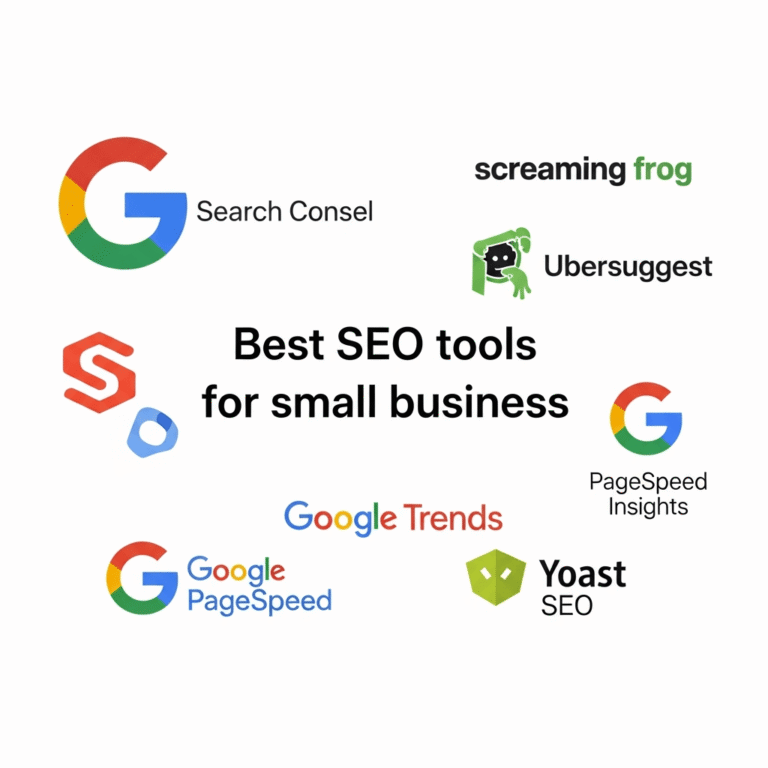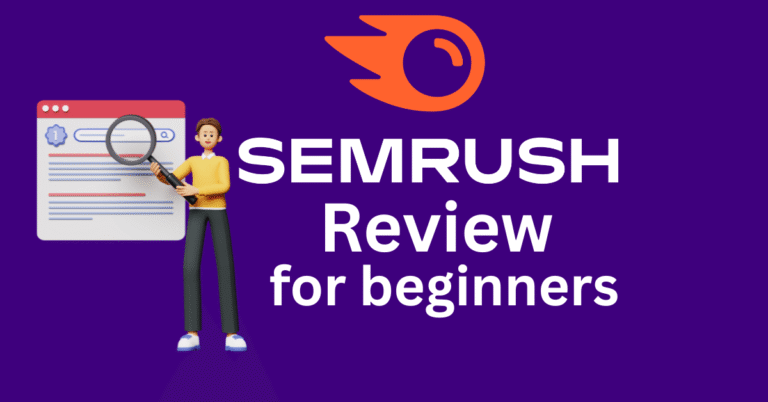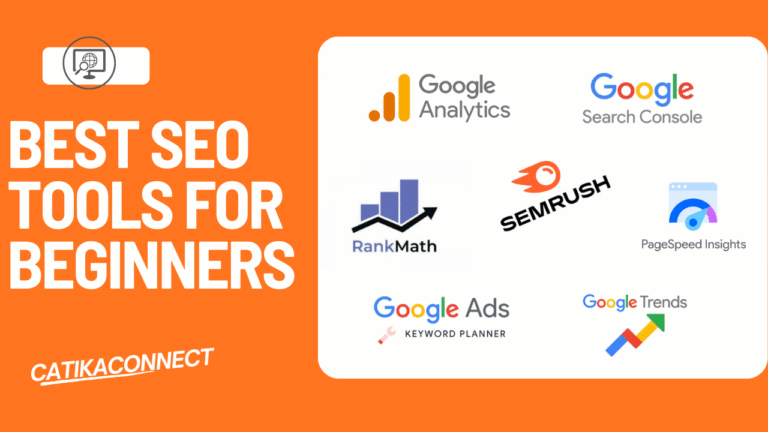If you’re just starting your SEO journey and trying to decide between SEMrush and Moz, here’s a quick answer:
Moz is beginner-friendly and an affordable tool, while Semrush is more powerful, with deeper data and advanced tools.
but which one should you choose as a beginner?
Both platforms offer powerful features to help with keyword research, backlink analysis, and website audits.
However, they differ in pricing, ease of use, and overall capabilities.
In this beginner-friendly comparison (2025), we will cover features , pros and cons, pricing, ease of use, and FAQS to help you choose the right tool.
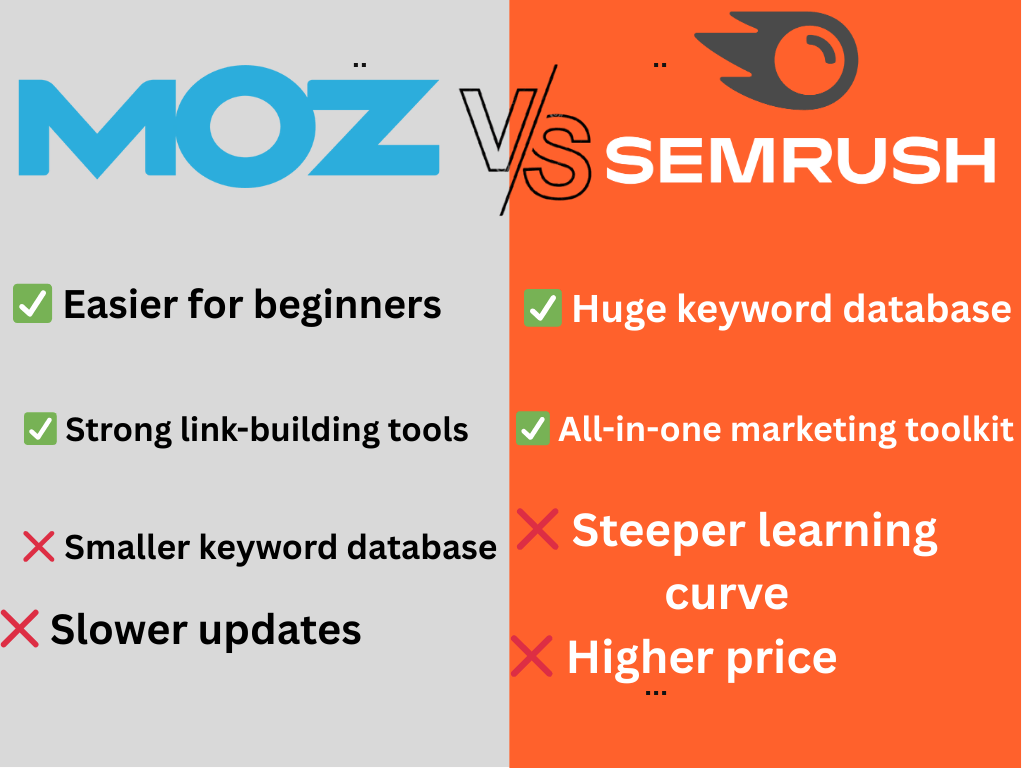
Table of Contents
Which One Should You Choose—Semrush or Moz?
For beginners, MOZ is easier to use, friendly for beginners, and less expensive, while Semrush is better if you want an all-in-one marketing platform.
however choosing between Semrush and Moz really comes down to what you need as a beginner.
- Semrush: All-in-one platform that covers SEO, paid ads, social media, and content marketing. Great if you want everything in one place.
- Moz: focuses only seo, simpler and beginner-friendly. suitable if your goal is improving your Google rankings and you want something a bit simpler.
So ask yourself: Do you want one tool for all your marketing needs (Semrush) or only a focused seo platform(Moz) ? your answer will tell you the best choice.
Which One Fits Beginners Better? Semrush vs Moz Compared features
Get an overview of Semrush vs Moz features in the breakdown below:
FEATURES | SEMrush | MOZ |
Best for | SEO experts, SEO agencies, large organizations | SEO beginners and/or experts, SEO agencies, small and large organizations |
Average | 4.5/5 | 4.4/5 |
Pricing | Starting at $117.33/ month | Starting at $49/ month |
Keyword research | Excellent keyword tools (6 total), database of 25+ billion keywords | Extensive keyword data with detailed reporting |
Keyword Rank Tracking | Tracks position, visibility, SERP features, more | Track up to 4,500 keywords |
Ease of Use | Powerful but tricky to learn for beginners | Friendly interface with slight learning curve |
Site Audits | Deep technical site analysis + performance reporting | Full website audit tools + performance insights |
SEO Content Tools | Content gap analysis, briefs, topic ideas | None mentioned |
Competitor Research | Analyze keywords, backlinks, and traffic sources | Analyze keywords and backlinks |
Backlink Analysis | In-depth backlink tracking and analysis | Strong backlink tools; track 1,000 backlinks across 100 lists |
Customer Support | Live chat, resource hub, classes | Chat, forums, help center |
AI Features | Content-based AI tools, some free AI utilities | None |
Integrations | Google Analytics, Search Console, Ads, Socials, WordPress, Zapier, and more | Moz Cast, GA4, GSC, WebCEO, Klipfolio |
Social Media Analysis | Complete toolkit: schedule posts, track SMM, analyze competitors | Doesn’t include dedicated social media tools |
Data Collection | Extensive coverage: SEO, PPC, competition metrics | Focused mainly on SEO: keyword rankings, backlinks, audits |
Strengths | SEO + digital marketing suite, large backlink database, strong integrations | SEO suite, user-friendly interface, customizable reports |
Weaknesses | Complex UI, higher starting price, limited non-SEO tools | Fewer integrations, lacks broader digital marketing tools |
Moz vs semrush: key difference at a glance
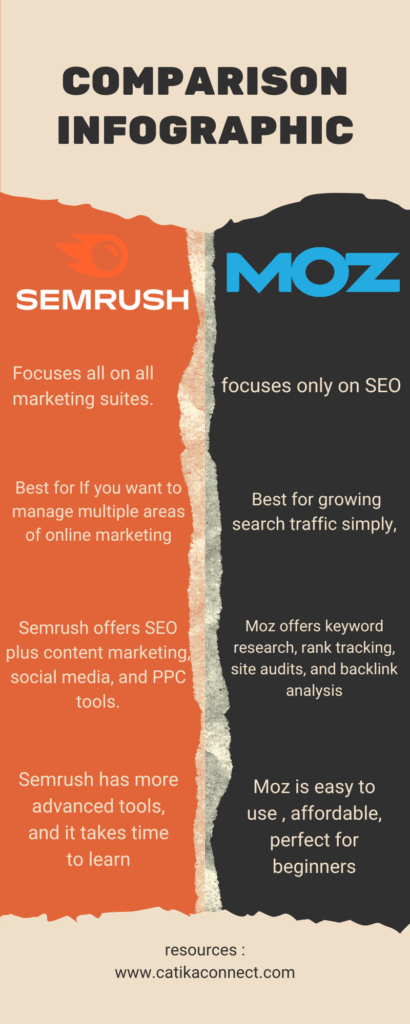
Inside Semrush
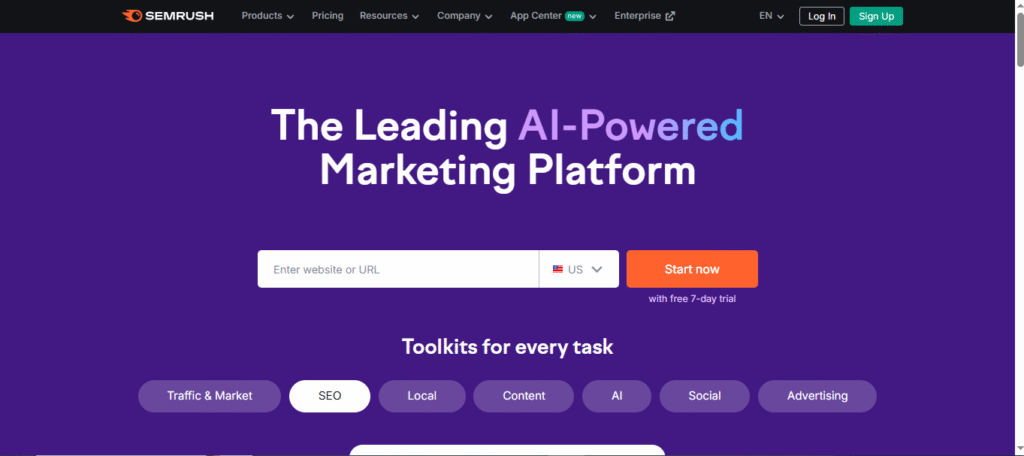
Semrush Pros: Why Do Beginners Love It?
Semrush is a full digital marketing suite that goes beyond SEO. It includes tools for keyword research, site audits, content marketing, social media, and PPC. Beginners can still use it effectively, though it’s more advanced than Moz. Let’s explore what makes it stand out:
1. Detailed Analytics Made Simple
Semrush is packed with analytics, but that doesn’t mean it’s hard to understand. You get clear, data-driven insights on everything from keyword performance to domain traffic.
Whether you’re analyzing your own website or spying on competitors, Semrush gives you accurate numbers to guide your strategy — no guesswork needed.
2. Powerful Keyword Research Tools
If you’re serious about getting found on Google, keywords are key. Semrush has one of the largest keyword databases in the world — with over 25 billion keywords available.
Tools like Keyword Magic, Keyword Gap, and Organic Traffic Insights help you discover what your audience is searching for and how to rank for those terms.
Even beginners can use these tools to find low-competition keywords to start ranking faster.
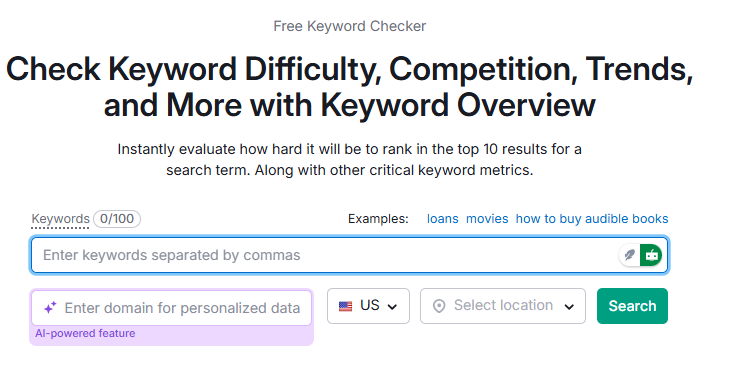
3. More Than Just SEO
Unlike Moz, which focuses mostly on SEO, Semrush offers tools beyond search engine optimization. It includes toolkits for content marketing, social media scheduling, and even paid advertising. That makes it a great choice if you want to manage everything in one dashboard as your skills grow.
4. Built-In Social Media Tools
If you’re active on platforms like Facebook, Instagram, LinkedIn, or Twitter, Semrush can help you there too. It offers a built-in toolkit to schedule posts, track engagement, and analyze competitors — all in one place. You don’t need separate tools for content and social media anymore!
5. Rich Data From Multiple Sources
Semrush gathers data from all corners of the internet — search engines, paid ads, backlinks, and more.
It gives you a full picture of your site’s performance, including where your traffic comes from, what your audience does on your site, and how your competitors are performing. It’s like having a full digital marketing team inside one tool.
6. Competitor Analysis
Semrush lets you see what your competitors are doing, including their top keywords, backlinks, and traffic sources. This is really helpful for beginners because it shows you exactly where you have opportunities without guessing.
For example, you can find keywords your competitors rank for but have low competition, giving you a chance to rank faster and get traffic.
In short :Semrush is more than just an SEO tool — it’s a full digital marketing partner. And even though it offers advanced features, it’s still approachable for beginners who are ready to learn and grow.
Semrush Cons
While Semrush is packed with features, there are a few drawbacks — especially when comparing it to a simpler tool like Moz.
1. Pricey for Beginners
Semrush starts at $117.33/month, which can be a big investment if you’re new to SEO. Some of its extra features also come with add-on costs. On the other hand, Moz’s starting price is lower, which makes it slightly more accessible for small businesses or solo marketers.
2. Steep Learning Curve
Semrush has a ton of tools, which is great—but it can also be confusing at first. If you’re just getting into SEO, the dashboard might feel overwhelming.
Compared to Moz, which offers a cleaner and more beginner-friendly interface, Semrush can take longer to get used to.
3. Complex User Experience
Even experienced marketers admit that Semrush’s layout can be a bit much. Finding specific features sometimes takes multiple clicks. Moz, by contrast, keeps things simpler with fewer tools but a smoother user experience.
4. Limited Local SEO Features (Compared to Moz)
If you’re a beginner working on a local business website, Semrush might not be the perfect fit out of the box.
Unlike Moz, which includes stronger built-in local SEO tools, Semrush’s local SEO features are locked behind paid add-ons like the Listing Management tool, which costs extra every month.
So, if you’re just trying to rank your local salon, cafe, or small store, it might feel like you’re paying for more than you need—and still missing tools that come standard with Moz.
In short, Semrush is powerful but not always the easiest or cheapest option for beginners. If you want simplicity and lower cost, Moz might feel more comfortable. But if you’re ready to invest time and money, Semrush gives you much more room to grow
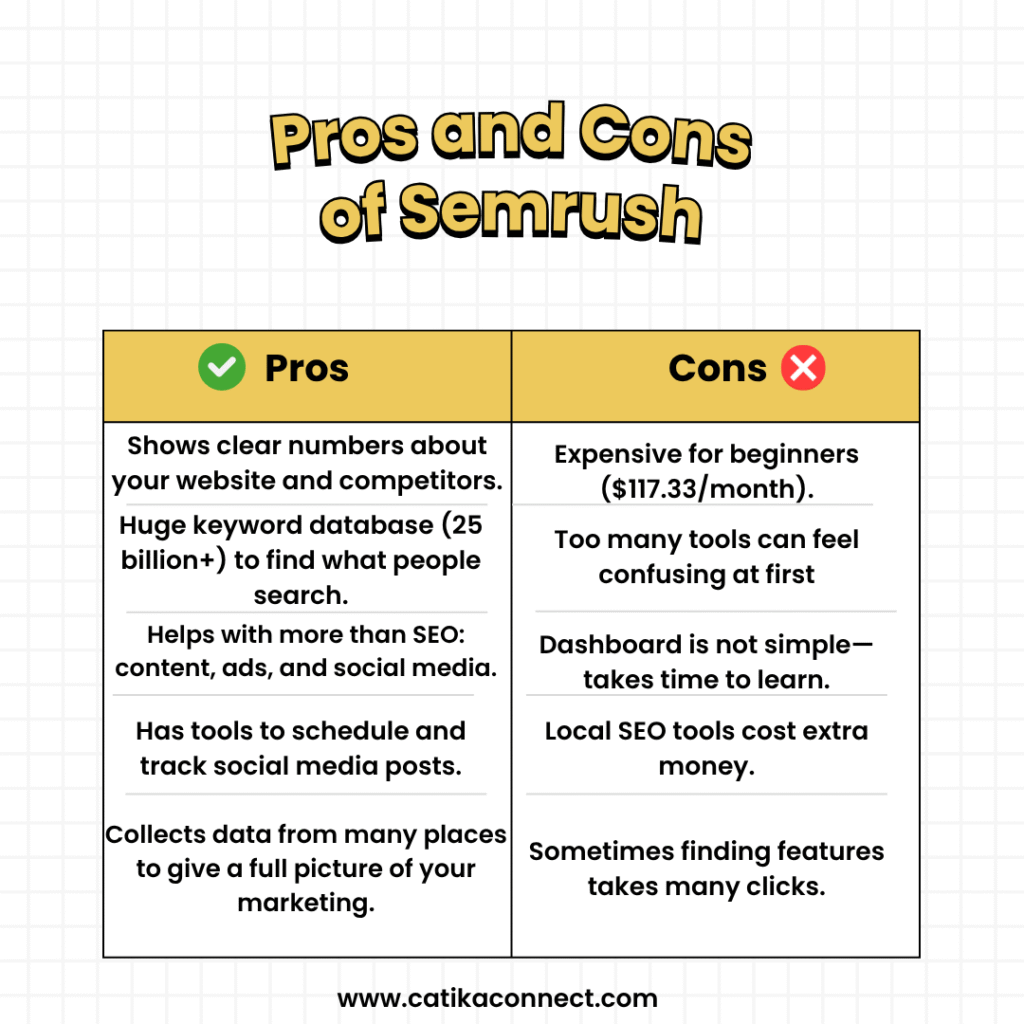
Inside Moz
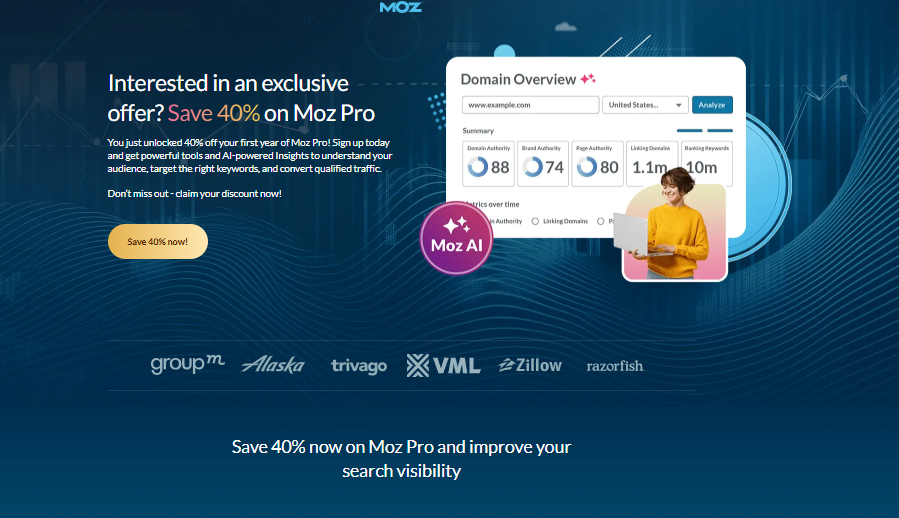
Moz is the company, and Moz Pro is their all-in-one SEO toolkit. In this section, we’ll focus on Moz Pro—the paid version designed to help improve rankings, fix SEO issues, and build quality backlinks.
Moz Pros: Why do beginners love?
Moz Pro is an SEO-focused toolkit built to make search optimization easier for beginners.
Unlike Semrush, which covers multiple areas of digital marketing, Moz keeps its focus on helping you improve rankings, fix site issues, and build authority in Google.
That makes it a simple choice if SEO is your main goal. Let’s explore what makes it stand out:
1. Keyword Explorer
Moz Pro’s Keyword Explorer is a favorite among users. It helps you find new keyword ideas, group them into lists, and prioritize based on difficulty and search volume.
It also gives you suggestions to target low-competition keywords — which is perfect for beginners.
2. Link Explorer
This tool lets you monitor your website’s backlinks. You can check domain authority, find new link opportunities, and even track spammy links.
For anyone working on off-page SEO, Link Explorer is essential.
3. Site Audit and In-depth Analytics
Moz Pro offers a powerful site audit tool that checks your website for technical SEO issues like broken links, missing meta tags, and slow-loading pages. Plus, it shows how your SEO performance changes over time — a great way to track improvements.
4. Data collection capabilities
Moz Pro specializes in gathering SEO-specific data, such as keyword rankings, site audits, and backlink metrics.
What makes it stand out is its well-known Domain Authority (DA) and Page Authority (PA) scores — helpful indicators for understanding how strong a website is in search results.
With these tools, you can easily compare your backlink profile with competitors and spot new opportunities to grow your SEO presence through smart link building.
5. Easy-to-Use Interface
Moz Pro is known for its clean and user-friendly dashboard. Unlike other tools that can feel overwhelming, Moz’s layout makes it easier for beginners to learn and use without confusion.
6. Helpful Learning Resources
Moz Pro comes with access to Moz’s well-known guides, blogs, and video tutorials.
If you’re unsure how to use a tool or what something means, you’ll always find beginner-friendly help just one click away.
In short: Moz Pro focuses only on SEO, which makes it easier to use and perfect for beginners who just want to grow their Google rankings without paying for extra tools they don’t need.
Moz Cons
While Moz Pro offers some powerful SEO tools, there are a few drawbacks to keep in mind—especially for beginners.
1. Pricing gets higher as you grow
Although Moz Pro starts at a lower price than Semrush, costs can add up fast.
As your needs grow, you’ll likely need to upgrade your plan to unlock more features—which can get expensive over time.
2. Onboarding takes some time
For those new to SEO tools, getting started with Moz Pro might feel a bit overwhelming. The setup and navigation aren’t as intuitive as some other platforms, so expect a bit of a learning curve.
3. Some features are locked behind higher plans
Moz Pro does include helpful tools, but not all of them are available in the lower-tier plans. To access its full power, you’ll need to pay for higher subscriptions.
4. No social media or PPC Tools
Unlike Semrush, Moz Pro doesn’t offer tools for managing or analyzing social media performance.
If social media is part of your marketing strategy, you’ll need a separate tool for that.
In short: Moz Pro is simpler and beginner-friendly, but it’s limited to SEO only. If you want extra features like social media or PPC tools, you’ll need to look elsewhere.
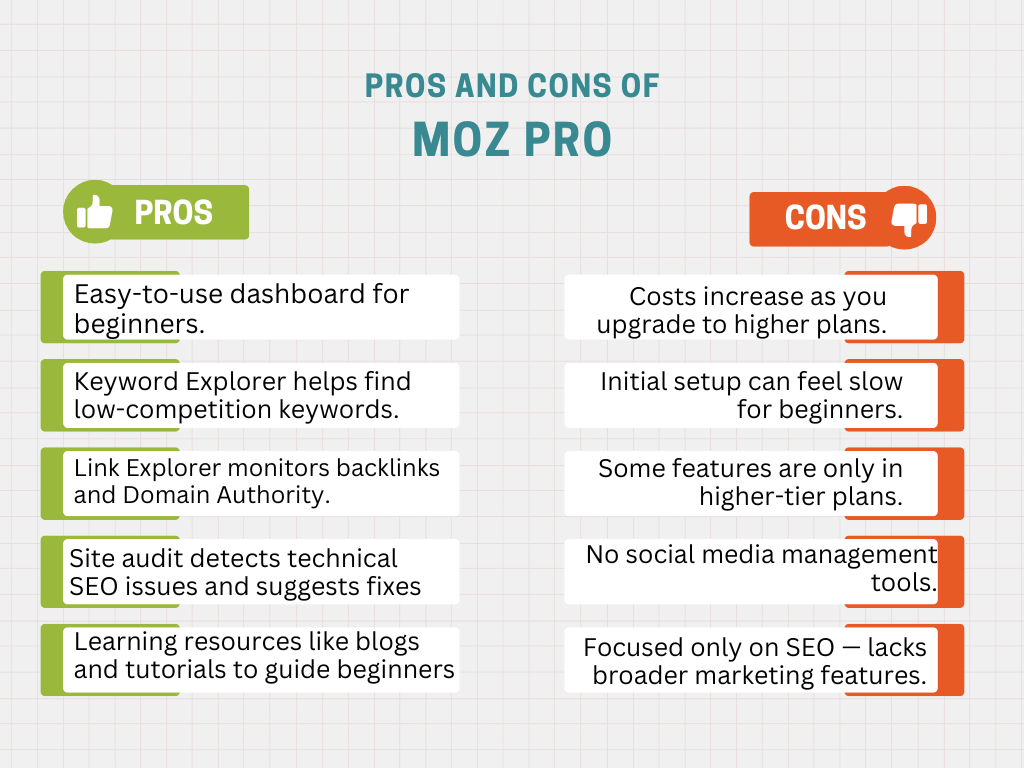
How to Choose Between Semrush and Moz
Still unsure which tool is the better fit for you? Here are a few simple steps to help you decide:
Set your budget
Both tools offer paid plans, so it’s good to know how much you’re willing to invest in SEO each month.
Understand your needs
Are you looking for an all-in-one marketing suite (like Semrush)? Or do you prefer a platform that focuses only on SEO (like Moz)?
Think about who will use the tool
If you’re working solo or just starting out, you might want a tool that’s easier to learn. If you’re part of a team or agency, advanced features might be more valuable.
Once you know your budget, needs, and preferences, the choice becomes clearer.
Still not sure? You can try both tools — they offer free trials so you can explore before making a decision.
Try Semrush and Moz Pro for Free
Not sure which tool is right for you? The best way to decide is to test them yourself. Both Semrush and Moz Pro offer free trials that let you explore their dashboards, tools, and features without paying upfront.
Semrush Free Trial: Explore its full SEO, social media, and PPC toolkits.
Moz Pro Free Trial: Try the keyword explorer, link tracking, and site audits.
Final Opinion: which SEO tool fits your goal?
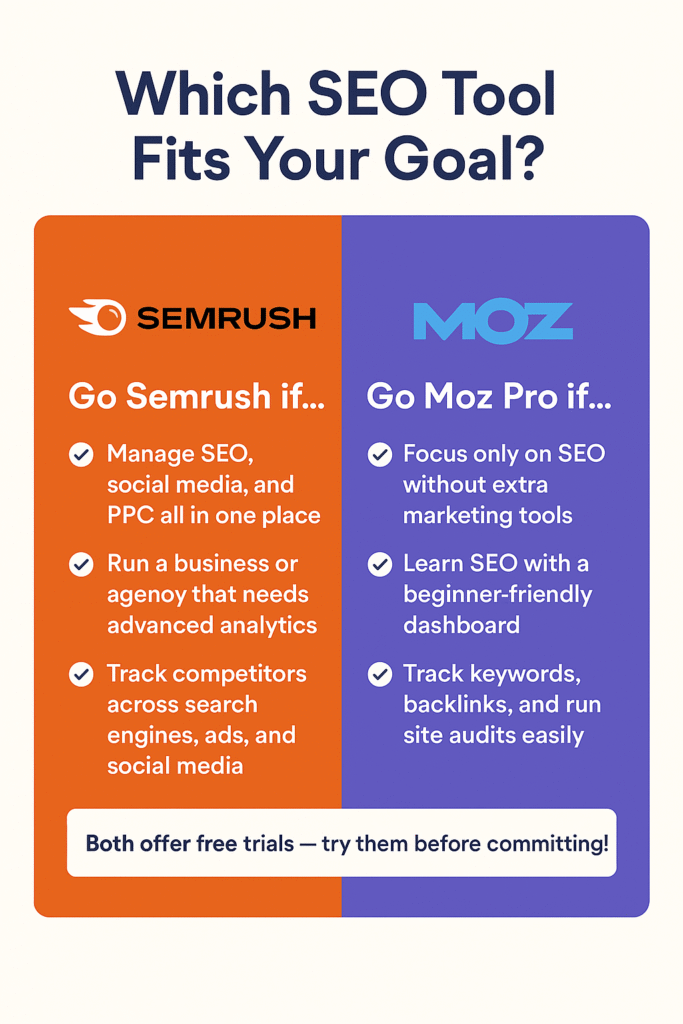
FAQS
-
Which SEO tool is easier for beginners: Semrush or Moz?
If you’re just starting with SEO, Moz Pro is easier to use because it has a clean and simple dashboard. Semrush is more advanced with extra features for SEO, PPC, and social media, but beginners may find it overwhelming at first. Start with Moz if you want simplicity, or Semrush if you want an all-in-one marketing tool.
-
Which tool is better for finding keywords?
Keywords help your website appear in Google search. Semrush has a large keyword database with detailed metrics, perfect for deep research. Moz is easier for beginners who want quick keyword ideas and simple data.
-
Can I track my website rankings with Semrush and Moz?
Yes! Both tools let you track your website rankings over time. Semrush gives detailed reports, history, and competitor tracking. Moz is easier to read and understand, making it great for beginners.
-
Which tool is cheaper for beginners?
Budget is important when starting SEO. Moz is usually cheaper and works well for basic SEO tasks. Semrush is more expensive but offers more features like competitor analysis, backlink tracking, and content ideas. Beginners often start with Moz, then upgrade to Semrush later.
-
Do I need both Semrush and Moz, or is one enough?
For beginners, one SEO tool is enough. Choose Moz if you want an affordable, beginner-friendly SEO tool. Pick Semrush if you want a complete digital marketing suite with SEO, PPC, and social media features. Later, you can add the other tool if you need more insights.
-
Does semrush or moz offer free trial?
yes! Both Semrush and Moz Pro offer free trials so you can test their features before paying. Start your Semrush free trial or try Moz Pro free here. this is a great way for beginners to see which seo tool feels easier and fits their needs without risk.

